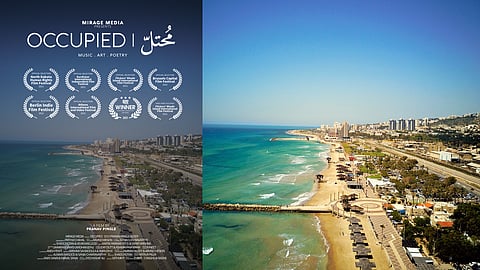
- HOMEGROWN WORLD
- #HGCREATORS
- #HGEXPLORE
- #HGVOICES
- #HGSHOP
- CAREERS
- ABOUT US
- CONTACT US

When filmmaker Pranav Reddy first met Shadi Zaqtan — musician, pub owner, and one of the many artists featured in 'Occupied' — it was at an airport, thousands of miles away from Ramallah. They exchanged Facebook messages. Zaqtan told him, “Come stay with me.”
Pranav assumed it was just politeness. But weeks later, he and his crew were sleeping in Zaqtan’s home, filming across Palestine, gathering footage that would become one of the most haunting portraits of life under occupation.
What sets Occupied apart is that it never tries to shock. It doesn’t brandish horror for effect. Instead, it captures the ache of endurance — the daily, private decisions to remain. “Everything was based on a conversation,” Pranav tells me. “I just wanted to know a little bit more about their life.” That curiosity — gentle, open, but insistent — is the engine behind this film. Shot in 2016–17 and released in 2020, it’s seen a resurgence in viewership in the past two years as Palestine dominates global headlines.
Unlike many documentaries on Palestine that focus solely on violence and victimhood, Occupied is a film about presence. It’s about people trying to make meaning in a world where so much has been taken from them. “Since the kind of stories that we were exposed to through the media [were only] about pain and suffering and death,” Pranav explains, “we wanted to showcase how there are also other kinds of people who are living under occupation.”
That doesn’t mean the occupation is erased from the frame. Far from it. The walls, the checkpoints, the military — these are present in every shot, even if only as background noise. But Pranav focuses his lens instead on dancers, rappers, and artists. It’s resistance through rhythm, colour, and breath.
The documentary was shot in 35 days on a shoestring budget. “Before I went to Palestine, shooting the film drained everything from my life, including my savings,” he recalls. Getting the footage was fraught with risk. Drone shots had to be timed to avoid military patrols. Every frame in the film could have cost him five to ten years in jail. “The reason the film is where it is,” he says, “is because all you need to do is care a little bit about someone else's suffering.”
“I never imagined Palestinian could be like this” — that’s what most viewers say after watching the film, according to Pranav. That sentence alone reflects the deep damage done by decades of caricature. And so Occupied becomes a kind of antidote: not just to propaganda, but to forgetting. “Palestine shaped me as a person,” Pranav says. “It’s impossible to put into words the feeling of knowing that thousands of people wanted this film to be made, prayed for us, and blessed us.” It’s not the spectacle of suffering that moved him, but that joy is resistance. Even now, as Israel’s genocide has killed over 55,000 people, the artists continue to live, love, and make. “Every time I speak with Shadi and the others, they tell me not to worry and that they will be okay,” Pranav says. “It’s ironic because they even ask me if I need help!”
Pranav’s next film, Road to Rafah, will follow an Egyptian truck driver delivering aid to Gaza. But Occupied remains his most personal work — a gesture of care that grew into a political act. “In the end,” he says, “love always wins.” It left me with a stubborn sense of hope. “One of the most beautiful qualities that humans possess,” Pranav tells me, “is the deep desire to persevere and challenge injustice.”
He’s right. Resistance isn’t always loud. Empire will not win. It never has, not in the long run. It can bomb, bulldoze, erase maps, censor speech — but it cannot crush the memory that lives on in art. Rima Hassan recently said, “We think we are liberating Palestine, but it is Palestine that is liberating us.” I understand exactly what she means.
Watch Occupied on MUBI.
If you enjoyed reading this, here's more from Homegrown:
The Death Of An Artist: How Safdar Hashmi Pioneered Street Theatre As An Act Of Protest
Irrfan Khan: Remembering The Extraordinary Actor That Brought Ordinary Lives To Life
Men Written By Women: Celebrating Our Favourite Indian Softboy Protagonists
